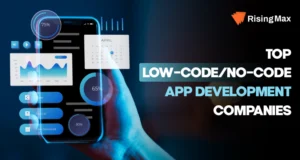Welcome to RisingMax Inc., a pioneering leader in IoT firmware development. With a relentless passion for innovation, we specialize in crafting cutting-edge firmware solutions that power the Internet of Things. Our expert team of engineers harnesses the latest technologies to create robust and secure firmware that drives seamless connectivity, efficiency, and intelligence in IoT devices. Join us in shaping the future of IoT as we empower businesses to deliver exceptional user experiences and drive digital transformation.
Unlock the Future with RisingMax Inc.! Elevate your IoT devices with our cutting-edge firmware solutions. Explore seamless connectivity, enhanced security, and unparalleled efficiency. Let's shape the IoT landscape together. Visit us now to innovate your technology-driven tomorrow!
What Is IoT?
The Internet of Things (IoT) refers to a network of interconnected physical objects or “things” embedded with sensors, software, and other technologies that enable them to collect and exchange data over the Internet. These objects can range from everyday items like household appliances and wearable devices to industrial machinery and vehicles.
The data collected by these IoT devices can be analyzed and utilized to gain insights, monitor conditions, automate processes, and enable various applications. IoT has the potential to enhance efficiency, convenience, and decision-making across industries, contributing to the concept of a more interconnected and intelligent world.
How IoT Helps Firmware?
IoT in firmware involves embedding software into interconnected devices, enabling them to communicate, collect data, and perform tasks seamlessly. This synergy between firmware and IoT technology empowers devices to share information, make data-driven decisions, and offer enhanced user experiences.
Our company specializes in developing this critical firmware layer, ensuring optimal connectivity, security, and efficiency for IoT devices. We harness advanced techniques to create agile, scalable, and secure firmware solutions that drive the functionality and transformative potential of the Internet of Things, shaping a smarter, more interconnected world.
Unlock the potential of IoT innovation with our expert firmware development services. Join us in shaping a smarter, connected world that enhances efficiency, security, and user experiences.
Our Firmware Development Services
Here is the list of services we deliver to our clients to manage and excel in their business.
IoT Strategy Consultation
We begin with a comprehensive consultation to understand your IoT project’s goals, requirements, and challenges, ensuring a tailored approach to firmware development.
Prototyping and Proof of Concept
Our team creates rapid prototypes to validate your IoT concept, enabling you to visualize device functionality and interactions before proceeding to full-scale development.
Low-Level Programming
We specialize in low-level programming languages and real-time operating systems, ensuring precise control and optimal performance for your IoT device’s firmware.
Secure Connectivity
Our experts implement secure communication protocols, such as MQTT or HTTPS, to establish reliable and encrypted connections between your IoT devices and the cloud, guaranteeing data integrity.
Sensor Integration
We seamlessly integrate various sensors and actuators into your firmware, enabling your IoT devices to gather and interpret real-world data accurately.
Edge Computing
Our firmware development includes edge computing capabilities, allowing your devices to process data locally and reduce latency, enhancing responsiveness and efficiency.
Power Management
We optimize power consumption through efficient coding and dynamic power management techniques, extending battery life for battery-operated IoT devices.
Remote Management
Our firmware solutions incorporate remote monitoring and management features, empowering you to control and update devices remotely improving maintenance and user experiences.
Scalability and Future-Readiness
We design firmware solutions with scalability, ensuring your IoT devices can adapt and thrive in evolving environments, offering longevity and future-proofing your investments.
Also Read: Use Case Of IoT In The Metaverse
Benefits Of IoT Firmware Development In Business
Let’s see what benefits a business can get with the IoT firmware.
Data-Driven Decision Making
IoT firmware development provides businesses with access to real-time data from connected devices. This data can be analyzed to gain insights into customer behavior, operational efficiency, and other crucial metrics, leading to informed decision-making.
Process Optimization
IoT firmware allows for automation and optimization of various processes. Businesses can streamline operations, reduce manual intervention, and improve efficiency by leveraging data-driven insights.
Enhanced Customer Experiences
IoT-enabled devices with well-developed firmware can offer personalized and seamless experiences to customers. Tailored interactions and services can lead to higher customer satisfaction and loyalty.
Remote Management and Monitoring
IoT firmware enables businesses to monitor and manage devices remotely. This is especially valuable for maintenance, troubleshooting, and updates, reducing downtime and operational costs.
New Revenue Streams
IoT firmware allows businesses to introduce subscription models, data-driven services, and value-added features. These new revenue streams can contribute to business growth and diversification.
Competitive Advantage
Embracing IoT firmware development can set businesses apart by offering innovative solutions, improved products, and efficient services. This can attract customers and partners looking for forward-looking and technology-savvy collaborators.
Also Read: Internet of Things App Development
IoT-Enabled Firmware Industrial Use Cases
Industrial Machines
Predictive Maintenance: IoT-enabled firmware in industrial machines collects data on performance and condition, enabling predictive maintenance scheduling. This reduces downtime, prevents costly breakdowns, and optimizes maintenance resources.
Real-time Monitoring: The IoT firmware allows constant monitoring of critical parameters in industrial machines, providing operators with instant alerts and data insights. This ensures timely response to anomalies, improving overall efficiency and safety.
Process Optimization: IoT-enabled firmware analyzes data from sensors within industrial machines to optimize manufacturing processes, minimize waste, and enhance product quality, increasing production efficiency.
Automotive
Connected Vehicles: IoT-enabled firmware connects vehicles to the internet, enabling features like remote diagnostics, over-the-air updates, and enhanced infotainment systems, improving driver experience and safety.
Fleet Management: IoT firmware tracks vehicles’ locations, fuel efficiency, and maintenance needs, facilitating efficient fleet management by optimizing routes, reducing fuel consumption, and enhancing overall logistics.
Advanced Driver Assistance Systems: IoT-enabled firmware powers ADAS features such as adaptive cruise control, lane departure warning, and collision avoidance systems, enhancing vehicle safety and reducing accidents.
Healthcare
Remote Patient Monitoring: IoT-enabled firmware in medical devices enables remote patient monitoring, allowing healthcare providers to track vital signs and health data in real-time, ensuring timely interventions and personalized care.
Smart Medical Devices: IoT firmware in medical equipment allows for automatic data collection and transmission, streamlining processes, reducing human error, and improving the accuracy of diagnostics and treatment.
Telehealth Services: IoT-enabled firmware facilitates telehealth services, enabling virtual consultations between patients and healthcare professionals, expanding access to medical expertise, and improving patient convenience.
Also Read: IoT In Oil And Gas Industry
IoT Firmware Development Tech Stack
| Layer | Technology |
|---|---|
| Microcontroller | ESP32, STM32, Arduino |
| Programming Language | C, C++ |
| Real-time OS | FreeRTOS, embed OS |
| Communication | MQTT, CoAP, HTTP/HTTPS |
| Wireless Protocol | Wi-Fi, Bluetooth, Zigbee, LoRaWAN |
| Security | AES Encryption, TLS/SSL, Secure Boot |
| Data Storage | EEPROM, Flash Memory, External Storage |
| Sensor Integration | Accelerometers, Temperature Sensors, Gyroscopes |
| OTA Updates | MQTT-SN, CoAP |
| Version Control | Git, SVN |
| Testing Frameworks | Unity, Ceedling, PlatformIO |
| IDEs | PlatformIO, Arduino IDE, Keil, STM32CubeIDE |
Remember, the choice of technologies may vary depending on project requirements, hardware compatibility, and the development team’s preferences.
Also Read: IoT In Automotive Industry
RisingMax Inc. IoT Firmware Development Procedure
Certainly, here’s a streamlined IoT firmware development procedure of RisingMax Inc.
Requirement Gathering
– Collaborate closely with clients to define the objectives, functionalities, and specifications of the IoT device’s firmware.
– Identify hardware components, communication protocols, and security considerations.
Design and Architecture
– Create a comprehensive firmware architecture plan detailing data flow, communication protocols, and user interactions.
– Ensure scalability, power efficiency, and compatibility with intended IoT devices.
Code Development
– Develop firmware code according to the design, utilizing best practices and coding standards.
– Implement efficient algorithms for data collection, processing, and communication.
Integration and Testing
– Integrate the firmware with IoT hardware, sensors, and communication modules.
– Conduct rigorous testing, including unit testing and integration testing, to ensure functionality and stability.
Security and Optimization
– Implement robust security measures such as encryption, secure boot, and access controls.
– Optimize the firmware for performance, memory usage, and power consumption.
Deployment and Support
– Deploy the firmware to IoT devices, ensuring smooth installation and activation.
– Provide ongoing support, including bug fixes, feature enhancements, and over-the-air updates.
Our IoT firmware development procedure focuses on delivering secure, efficient, and reliable firmware solutions that empower cutting-edge IoT devices.
IoT Firmware Development Cost
Determining the cost of IoT firmware development can be influenced by various factors. Here’s an overview of key considerations presented in 6 points:
Complexity and Features
The complexity of the firmware, including the number of features, interactions, and integrations required, significantly affects the cost. More intricate functionalities may require more development effort and resources.
Development Timeframe
The time required to develop, test, and deploy the firmware directly affects costs. Shorter timelines may necessitate additional resources, potentially raising the overall expense.
Security Requirements
Implementing robust security measures, such as encryption and secure boot, can increase development time and costs. However, these measures are crucial for protecting sensitive data and ensuring device integrity.
Testing and Quality Assurance
Rigorous testing, including unit testing, integration testing, and QA, ensures reliable and bug-free firmware. Extensive testing efforts can contribute to increased development costs.
Ongoing Maintenance and Support
Factoring in post-development costs, including regular maintenance, bug fixes, feature updates, and customer support, is essential for a complete cost estimation.
Remember that these points provide a general overview, and actual costs will vary based on project specifics, technology choices, and the development team’s expertise. Working closely with custom software development team or a technology partner is recommended to get an accurate cost estimate tailored to your project’s requirements.
Conclusion
RisingMax Inc. stands as a beacon of excellence in IoT firmware development. With a commitment to innovation and quality, we enable businesses to thrive in the digital era. Our tailored solutions promise seamless connectivity, security, and efficiency, transforming concepts into reality. Partner with us to unlock the true potential of IoT, and together, we’ll shape a future defined by cutting-edge technology and limitless possibilities.












